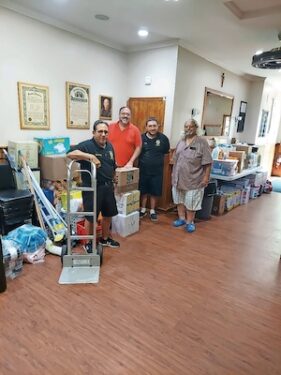
LEXINGTON, Ky. — In recent weeks, Father Bob Damron has spent his time driving down winding eastern Kentucky roads, stopping by anyone he sees cleaning up mud and flood debris to offer both spiritual and physical support — a shoulder to cry on and a shovel to help dig.
“I’ve been visiting people, letting them cry on my shoulder, and I let them tell their story of the flood — what they experienced, what they did — and just being with the people listening to their stories, crying with them, and talking with them. And then, of course, you get your shovel out, and you start shoveling mud and do whatever is needed,” Father Damron told The Tablet.
Father Damron is a retired priest in the Diocese of Lexington. He’s a lifelong resident of eastern Kentucky and therefore has experienced many floods, but still said his “heart broke” with the latest storms because of the historic loss of life.
In the aftermath of the destruction, Father Damron said he hopes his visits with those who were affected most give them hope that they’ll rebuild and reassurance that God is still with them.
“To listen to their stories means that their stories, what they experienced, have value, and that’s important for people to hear, that God has not abandoned them, that God is right here in the midst of all of this devastation,” Father Damron said. “That we need to have that faith that yes, it’s going to take years to rebuild, but we’ve been through this before as mountain people, and we are survivors, and we will survive.”
Father Damron is just one example of the way eastern Kentucky Catholic communities, the Diocese of Lexington as a whole, and people nationwide have stepped up to help those impacted by the flooding. To date, Catholic Charities of Lexington has received over $670,000 in donations, which doesn’t include a recent second collection at Mass.
They’ve also gotten about $250,000 from Catholic Charities USA. Even at a local level, donations have poured in. Kirsten Thorstad, the interim parish life director at Holy Cross Catholic Church in Jackson, told The Tablet that they have received over $20,000 in donations from the Jackson community and nearby Campton. The money goes directly into a flood relief account and is used to order essential items people need, she said.
Already, the basement of the small church that only sees 6-10 parishioners every week is stocked with diapers and other baby supplies, blankets, towels, non-perishable food, boots, gloves, hygiene supplies, clothes, sleeping bags, and more for people to come and get at their convenience. Thorstad and volunteers also make meals available, and in the parking lot, there’s a Catholic Charities USA laundry truck set up for people to use.
Though less than 1% of the local popula- tion is Catholic, Thorstad emphasized the importance of the Church caring for the entire community. “It’s not about the people in the church building,” Thorstad said. “We’re all children of God, and a parish is anyone in your area, so the true Catholic meaning is to serve all people in your area.”
Thorstad said the biggest needs right now are financial support and assessing solutions for people who have now had homes destroyed by floods for two consecutive years. She noted the importance of helping people discern “where they can live safely in a sus- tainable house.”
“I think last year most were at a point where they were going to stay here and raise the foundation if they got the funds, but now I’m hearing from people who don’t want to be near a water source,” she said.
To that end, Catholic Charities Lexington is now shifting to a long-term recovery response to help people make those decisions. Meg Campos, the executive director of Catholic Charities of Lexington, told The Tablet that they’re bringing in case managers to guide and help flood victims understand their options. The organization is also looking to bring in counselors to certain areas to meet people’s emotional needs, she said.
To continue helping with short-term needs, they have started giving out gift cards to those affected so they can purchase items they need. “Ultimately, it’s about helping people rebuild their lives,” Campos said.
